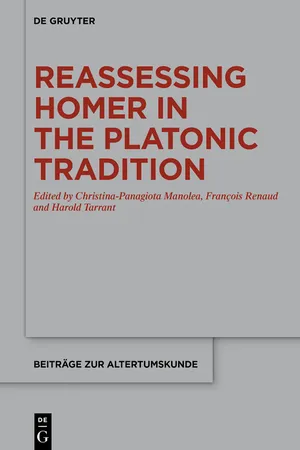
Reassessing Homer in the Platonic Tradition
- English
- ePUB (mobile friendly)
- Available on iOS & Android
Reassessing Homer in the Platonic Tradition
About this book
Plato's famous and infamous criticism of Homer was the climax of a series of attacks by early thinkers on the first and greatest Greek poet Homer. It triggers an even longer series of responses attempting either to justify further "the old quarrel between philosophy poetry" (Pl. Resp. 607b-c), or, in most cases, to reconcile the two great authors. The so-called Plato-Homer problem is in broad outline twofold, with numberless ramifications and sub-issues. Why does Plato's Republic repeatedly attack and even exile the greatest cultural authority of the Greeks? And why does he do so while quoting Homer abundantly – more than any other author – and even adapting many artistic features of Homeric poetry? This volume concentrates on the various responses to the controversy among Platonically minded writers, while including a few other reactions from just outside that circle. Strategies of reconciliation are many, including both allegorical and non-allegorical approaches, involving the notions of myth, mimesis, inspiration, wisdom, theology, etc. The volume presents original treatments of major figures, such as Porphyry and Proclus, as well lesser-known authors or texts (e.g. Platonic Spuria), and non-Platonists (Xenophon, Aristotle, scholiasts, etc.) who serve as enlightening comparative figures. While recent literature on these questions usually concentrates on single authors, this book details its reception in the Platonic tradition overall.
Frequently asked questions
- Essential is ideal for learners and professionals who enjoy exploring a wide range of subjects. Access the Essential Library with 800,000+ trusted titles and best-sellers across business, personal growth, and the humanities. Includes unlimited reading time and Standard Read Aloud voice.
- Complete: Perfect for advanced learners and researchers needing full, unrestricted access. Unlock 1.4M+ books across hundreds of subjects, including academic and specialized titles. The Complete Plan also includes advanced features like Premium Read Aloud and Research Assistant.
Please note we cannot support devices running on iOS 13 and Android 7 or earlier. Learn more about using the app.
Information
Table of contents
- Title Page
- Copyright
- Contents
- Introduction
- 1 Homer at the Banquet: Xenophon’s Symposium and Plutarch’s Symposiaka
- 2 The Way of Acting as Homer’s Odysseus: A Response to the Plato-Homer Question from Plato Onwards
- 3 Ὅσιον προτιμᾶν τὴν ἀλήθειαν: A Hidden Dialogue between Aristotle and Plato on Homer
- 4 Homer in the Platonic Dubia and Spuria
- 5 Poetic Enthusiasm: The (Mis)Fortune of a Platonic Image
- 6 Homeric scholia and the Platonic tradition: Πλάτωνα ἐξ Ὁμήρου σαφηνίζειν?
- 7 The Voice of Homer and That of His Characters: The Criticism of μίμησις (Resp. 393d – 394e) and Its Varied Reception
- 8 Homer and Plato as Philosophical Authorities in Cicero
- 9 Exemplum Homeri: Reception and Exegesis of the Epos in Plutarch’s Praecepta gerendae reipublicae
- 10 Ancient Wisdom in Maximus of Tyre
- 11 Odysseus’ Stormy Seas: From Ps.-Plato to Numenius and Beyond
- 12 War in the Iliad: Untruth for Plato, Allegory for Platonists, Truth for Our Times?
- 13 Homer, Plato and the Modes of Teaching Exposition
- 14 Allegorical and Non-Allegorical Readings of Homer in Proclus
- 15 Plato Ὁμηρικώτατος? Proclus on the Muses’ Speech (Resp. 8.545c – 547a)
- 16 Proclus on Plato as Emulator (zêlôtês) of Homer
- List of Contributors
- Index of Passages Discussed
- Index of Selected Names and Concepts